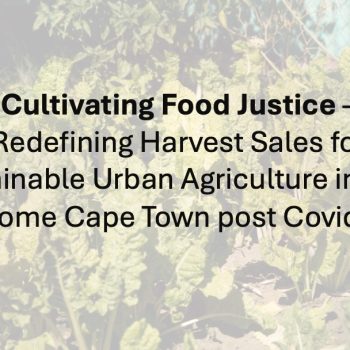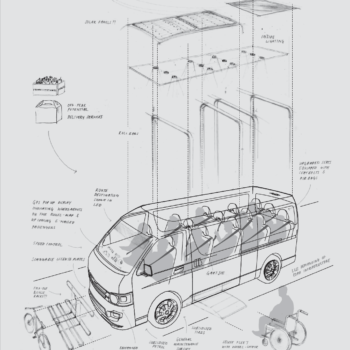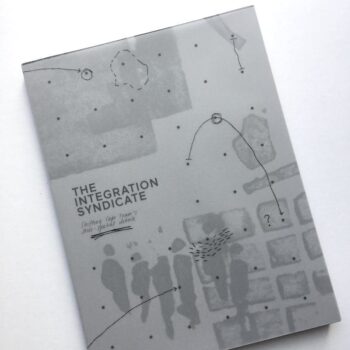Integration Syndicate
The Integration Syndicate entails a series of ten “episodes” over the course of a year, which explores the obstacles and solutions to social-spatial integration in the Cape Town metropolitan region. The Integration Syndicate is convened by Cape Higher Education Consortium and hosted by UCT’s African Centre for Cities and the Poverty and Inequality Initiative in partnership with Centre for Humanities Research, UWC and Centre for Complex Systems in Transition, US.
It is a public secret that we have no practical idea how to undo and remake the legacy of spatial inequality within the constraints of private property, existing real estate market dynamics and public policies that seem to exacerbate the problem, despite the best intentions of the state. The problems of spatial segregation, inequality and exclusion have recently burst onto the public sphere through a series of campaigns drawing attention to the sale of publicly owned land and the humanitarian impacts of gentrification processes. There is deep public interest in understanding why it is so difficult to shift stubborn spatial patterns and what can practically be done to not simply repeat the same debates over and over, without effecting any meaningful change on the ground.
Cape Higher Education Consortium (CHEC) has been committed to the formulation of relevant research and engagement with the public sector for at least a decade. Formal MOUs exist to give effect to attempts to foster a closer alignment between the research agendas of the four universities and public policy in the Western Cape. Building on this legacy, and the experience of the Africa Centre for Cities (ACC) in promoting coproduction of knowledge through the CityLab format, an extraordinary yearlong Integration Syndicate has been conceived.
It will entail a series of ten “episodes” to explore the obstacles and solutions to social-spatial integration in the Cape Town metropolitan region. ACC is collaborating with the Poverty and Inequality Initiative at UCT in this endeavour. ACC will also be working closely with the Centre for Humanities Research (UWC) and the Centre for Complex Systems in Transition (at the University of Stellenbosch) to shape the content and facilitate learning.
Ultimately, we hope to foster many “action networks” through encounters in this safe, open space. It is assumed that these objectives can only be achieved if a non-partisan, safe and open space is created for frank discussions and a commitment to collaborative searching for answers.
Objectives
- To create an open, critical, creative and patient space for learning and exchange about the drivers of spatial injustice and the elements of potential remedies;
- To foster an informed debate about the historical and contemporary factors that reproduce spatial injustice;
- To clarify potential areas for joint action between different actors in the city committed to creating more favourable institutional and political conditions for the pursuit of spatial integration linked to priorities that have been identified in public policy;
- To identify a research agenda pursued by various actors—universities, NGOs, social movements, private sector, public sector, and civic associations—in the service of keeping spatial justice on the policy and action agenda of the city.
Pedagogic Approach
The intention is to establish a “permanent” space where the discussion will be hosted and held in the form of a visual record of the deliberations and background contextual information. A4 Foundation has agreed to partner with ACC and the PII and act as hosts for the process. The conversations will unfold amidst a heavy reliance on maps, information graphics, and other data sources to allow anyone to enter the debate but also to avoid the risk of purely ideological stand-offs. The participants will be a fixed group of leaders drawn from the public sector, social movements, NGOs, academia and the private sector.
The ten episodes refer to theme-based sessions that will unfold over the course of a year and culminate in a public festival where the findings and insights of the syndicate will be presented.
Given the limited time, and the diverse nature of the participants, the following sequence of discussion has been adopted:
Episode 1: Why Integration? What is integration? Can it be achieved within the next generation?
Episode 2: Geo-Historical roots of segregation and fragmentation. How best can one acknowledge and engage the cumulative effects for different inhabitants of the city? Can such an understanding be redeployed to incite alterative imaginaries for an inclusive future?
Episode 3: What are the economic drivers of inclusion/exclusion and spatial inequality? What will it take to achieve inter-generational economic empowerment? What difference can/does space make?
Episode 4: Towards a Working Frame on the building blocks of integration. (This frame will then be applied to three geographic acupuncture points of the city that is already high on the priority list of the public sector.)
Episode 5: Case study >> Two Rivers Urban Park acupuncture point
Episode 6: Case Study >> Philippi Transit-oriented development hub acupuncture point
Episode 7: Case Study >> Bellville Transit-oriented development hub acupuncture point
Episode 8: Weaving the cases and other sites of opportunity for the next decade (drawing on Voortrekker Road Corridor)
Episode 9: Popularising and embedding integration in the public sphere of the city, Kaapse innovation
Episode 10: How to embed this in the public realm? Rehearsing for the Conference & Closure.
It is our belief that the Integration Syndicate can create a much broader, nuanced and inclusive policy community that may not all agree on what needs to be done, but at least create the basis for more effective action across diverse political and institutional settings in the city. This will undoubtedly induce a better quality public debate, a higher probability of effective policy priorities and follow-through and a larger network of informed and passionate urbanists across diverse fissure lines of the city.
Programme details
Cape Higher Education Consortium, Poverty and Inequality Initiative, Centre for Humanities Research, UWC, Centre for Complex Systems in Transition, US, Mistra Urban Futures, A4 Arts Foundation, Instinct



